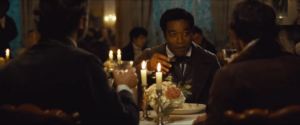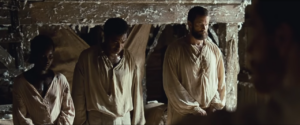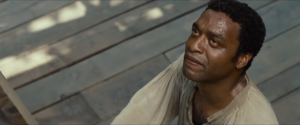Rating: 6 out of 5






The further away and the more time we get away from an incident, the more it seems to become lost in memory. Yet, we always need to go back and look at the past and history to remember how far we have come and how far we still have to go. Cinema has a unique way of making us remember the times before. Even though film can be dramatized, it can still be a pathway to learning more about the times before.
All countries have a dark period in their history. No country is perfect. In the United States, one of the darkest periods was slavery. A time when under law, an enslaved person was treated as property and could be bought, sold, or given away. Slavery had been practiced in British America from the early colonial days all the way through the Deceleration of Independence (1776) to it being finally outlawed with the passage of the Thirteenth Amendment (1865). Through the years, there have been films that showed the evils of slavery. Amistad showed some of the extremes of slavery. Many years later, Django Unchained came out and showed some of the evils of the South. Now I know I am forgetting a few in-between, but those movies opened the door.
Written by John Ridley and directed by Steve McQueen, 12 Years A Slave is that film that jumps through the door and shows the real evils of slavery. The true and inspiring story of Solomon Northup, an African-American freeman who, in 1841, was snatched off the streets of Washington, and sold into slavery only to endure and reach freedom once again.

12 Years A Slave opens with a group of slaves receiving instructions on cutting sugar cane. The scene shifts to a group of living areas for the slaves. The film introduces Solomon Northup (Chiwetel Ejiofor), eating his food and noticing the dark juice of the blackberries, becoming inspired to create ink and a quill. Solomon’s life flashes back to a happier time with his loving wife and children. Solomon is a free man who plays the violin better than anyone and is in high demand to perform. Later on, Solomon encounters a friend who introduces him to two travelers claiming to work with a circus-like show. The two men promise him large sums of money to accompany them to Washington DC. Solomon agrees to join the men. We soon see the three men at a restaurant in DC. The two men show Solomon a bag of money and the promise of many more riches. The men drink wine as one watch Solomon’s glass carefully. The next scene begins Solomon’s nightmare journey. Solomon wakes up in a cell chained up. He is beaten savagely and told that he is a runaway slave from Georgia. Despite his protest of being a free man, Solomon’s life has changed to him now being a slave and sold off.
After watching 12 Years A Slave, I am going to admit, this film was a HUGE punch in my gut. As a black man from the South, it had me disgusted and in pain because I know my ancestors went through this. This film is one of the few films that I would say should be shown in school. If we praise the good of our history, we should also show the bad, and this film holds nothing back. I would say showing Roots would work, but this takes Roots to a whole new level and more.

Steve McQueen holds nothing back and truly shows the pain a person and people went through with scene after scene. Even if you tried to turn your head, you couldn’t look away. What I call The Roots scene where Solomon wakes up in chains. He is beat with a paddle across the back for saying he is a freeman. He is beaten until he submits to saying he is a runaway slave. As the story progresses and he is sold to other plantations, the beatings become fiercer. In one scene, after Solomon fights back just once. He is strung up over a tree where his feet can barely support himself. It is sickening because the other slaves go about their daily activities while he is trying to just survive. In another scene, when Solomon gets the idea to run for freedom, he runs through the woods and turns in one direction. He runs into a group of white men who have two slaves ready to hang. As they let Solomon go, we see in the background that they are lynched. Once again, nothing is held back in this film.

Two scenes that must be talked about are the steamboat scene and the selling scene. The first scene is when Solomon is on the slave ship to New Orleans, and he meets other slaves. He is told by the others that if he wants to survive in the South, he must adapt to being a slave and not tell anyone he is a free man. While another says that he should fight. Well, the one that tries to fight is killed and thrown in the water. What is sickening is the one that says adapt, runs to his master like a lost puppy, but while speaking on the ship, he talks about the other slaves how they know nothing but being slaves. Total hypocrite! Now the scene that made it gut-wrenching in the beginning was when Solomon is introduced to a slave trader named Theophilus Freeman. He gives Solomon the identity of “Platt,” a runaway slave from Georgia, but that wasn’t the worse part. It was when they were in the auction house. The slaves standing around like they were displays in a furniture store. How the whites came in looking to buy like the slaves weren’t even human. Actually, they weren’t human in the eyes of the people, just property.
Daniels expertly put in two songs that must be mentioned. They are “Run, N****r, Run,” and “Roll, Jordan, Roll.” The first song, “Run, N****r, Run,” is presented around the beginning of the film. John Tibeats tries to make the slaves clap along as he sings the song. It is used as a type of warning to the slaves as they seem to really resent it but are trapped. The primary purpose of the song is to break the slaves’ spirits. To make them know that they will never be free from their duties.

The second song that was used was the powerful spiritual “Roll, Jordan, Roll.” The scene that the song was sung is one that is truly powerful. In it, Solomon and the other slaves on the plantation sing the song as they have a funeral for one of their own who died of exhaustion in the field. It has so much meaning that brought some tears to my eyes. One can interpret the purpose during the funeral is freedom. That the one who died is finally free of the pain and suffering that he endured. The second meaning has to deal with Solomon himself. He has fought so hard with keeping his mind on freedom. That one day, he will make it back to his family. Yet, we see the change in his character. At first, he doesn’t join in with the singing, but we can see the internal struggle in his face, mind, and soul. Finally, he just breaks. He seems to accept his fate that he will die a slave and that the only way he will ever see his family again is through death. Yep, I cried and even joined in the singing.
Daniels tried to find some of the best actors and actresses for his film. One knows it can’t be easy to find actors to take on roles that would make them feel uncomfortable. Just look at Leonardo Dicaprio and how he had a hard time with Django Unchained.

Chiwetel Ejiofor gave a compelling and magnificent portrayal of Solomon Northup/Platt. Ejiofor MUST be commended and praised for the role that he took on. This wasn’t an easy role to play, but he played it magnificently. He gave Solomon such depth where one had so much empathy for a person and the situation they were put in.
Lupita Nyong’o you deserve your Academy Award. Playing Patsey was one thing, but going through what Patsey had to go through was another. One has to feel sorry for Patsey because of what she went through. Not only from the master but the master’s wife. To have things thrown at you or not washing is terrible. Wishing for death truly added to your character and making you wish that you were free.

Now the supporting cast was great even though I really wanted to punch some of them. Michael Fassbender as Edwin Epps was a truly evil man. Fassbender played him with such vile and hatred. Then Sarah Paulson, as Mary Epps, was just as evil and no good. What she did to Patsey was genuinely evil. Jealousy isn’t a great thing to have. Paul Giamatti, as Theophilus Freeman, was despicable. Splitting up families just for money. Paul Dano, as John Tibeats was good. He brought that There Will Be Blood acting to the film. I was so happy when you got, you’re a** handed to you. Finally, Benedict Cumberbatch as William Ford. You played your character with such kindness, even though you were a slave owner. You get a pass.
12 Years A Slave is one of the best movies ever made dealing with one of the worst subjects in US history. It is a story that needed to be told, and Daniels told it to perfection. Ejiofor and Nyong’o give such powerful and intense performances that they must be applauded. The courage and faith of one man should be taught in school for years to come.